Related Topics
Benjamin Franklin
A collection of Benjamin Franklin tidbits that relate Philadelphia's revolutionary prelate to his moving around the city, the colonies, and the world.
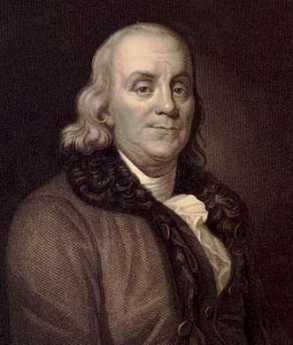
Franklin Inn Club
Hidden in a back alley near the theaters, this little club is the center of the City's literary circle. It enjoys outstanding food in surroundings which suggest Samuel Johnson's club in London.
Reminiscences
"The past is never dead. It's not even past." -- William Faulkner, Requiem for a Nun
Foreign Affairs
This topic is under construction. Feel free to watch it evolve.
Whither, Federal Reserve? (2)After Our Crash
Whither, Federal Reserve? (2)
Franklin's Admirers on TV
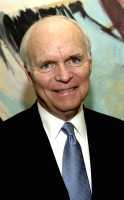
|
| Brian Lamb |
There are now three channels of C-span, continuous cable television programs about the influence of history on current problems. Sessions of Congress and its committees, the speeches of the President, political campaigns, are shown as they happen. But interviews and book reviews are shown in parallel, with an opportunity to go into the archives and organize originally unrelated programs into seminars on a current topic. The editor, Brian Lamb, has a light hand and considerable impartiality. But he's there, all right, organizing blogs into topics just as Philadelphia Reflections tries to do.
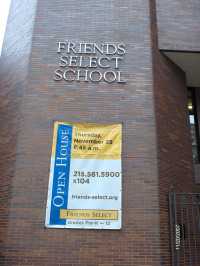
|
| Friends Select School |
This similarity of design had been floating around for some time, but it suddenly came into focus when I recognized myself in the front row of an audience on C-span, listening to Edmond S. Morgan talking at the Friends Select School about his new book on Benjamin Franklin, a few months earlier. Thank goodness I bought a book and had it autographed because the filming had been so unobtrusive I hadn't noticed it at the time. I clearly need to have haircuts more frequently. Professor Morgan's parting words that evening had stayed with me, "Franklin doesn't tell you everything about himself, but what he tells you -- is straight." That's quite a compliment from the editor of 47 volumes of Franklin's work.
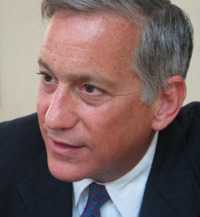
|
| Walter Isaacson |
Grouped with this tv portrayal of me as a groupie were interviews with Walter Isaacson and some other Franklin biographers, taken at other times and placing focus on other aspects. Here again, more insights emerged from quickly considered replies to audience questions than from the prepared speeches. Replies to questions from the audience are more in a class with blogs, anyway. Whenever you get all of the adjectives and qualifications polished, you sometimes don't say what you mean. Perhaps that last comment can be rearranged to say that answering audience questions occasionally leads to blurting out precisely what you mean.
And so, two unrelated audience answers need to be linked. A question about Franklin's love life caused Isaacson to refer to Franklin as a lifelong seducer. From the unknown mother of his illegitimate son William, to the simultaneous flirtations with two famous French ladies that took place when he was an octogenarian, and not overlooking several other affairs with Cathy Green and Polly Stevenson and allusions to others, Franklin was obviously an accomplished seducer in the full meaning of the term. It is thus legitimate to suspect the techniques of seduction at work in many of his public projects, from starting the Library Company to persuading the French to help the Revolution. He discovered late in life what many have discovered about the life of a diplomat, and quickly recognized that he was already pretty good at what that seemed to entail. Let's slide to a slightly different application of that idea.
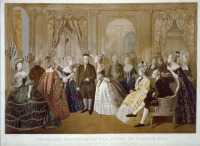
|
| Benjamin Franklin and French Women |
By the accident of hostess seating arrangement, I found myself seated next to two historians from Harvard, and somehow it came out that one of them felt that Franklin loved the French. Simply loved them. Somehow that didn't sound quite right when compared with Franklin's early years of mobilizing Pennsylvania to fight the French, starting the first National Guard militia unit to defend Philadelphia against French raiders, supporting General Braddock's expedition with his own money, urging the British government to sweep the French from Canada, and working most of his life to assemble the colonies and Great Britain into one world-dominating entity. It's true that 18th Century France was at the peak of scientific achievement, and Franklin the inventor of electricity was quickly taken in by the European scientific community, but that's scarcely the same thing as loving France. Louis XVI was in fact quite annoyed by all the attention Franklin was receiving. And so the scholar on TV went on to say that correspondence had been discovered in which Franklin quite casually remarked that during the Continental Congress he had strongly argued that America should stand alone and have no European allies. Congress it seems overruled him, so he dutifully set sail for France to seduce them.
We come to another chance social encounter. On a recent trip to Paris, the GIC had taken along as a speaker, no less than a member of the Open Market Committee of the Federal Reserve, a Governor of a Federal Reserve District, to speak about the threat of inflation and currency crisis. In time, our French hosts invited us to look at some documents of interest, like the Louisiana Purchase. Lying on the table was the original treaty between America and France, signed by B. Franklin. The Federal Reserve governor, making small talk, observed that Franklin sweet-talked the French into loaning America too much money, eventually leading to their bankruptcy. As I recall, my rejoinder was, "Well, just print some more paper money, right?" It was intended to be a jocular remark, but it somehow didn't seem to be taken as such.
Originally published: Saturday, June 14, 2008; most-recently modified: Friday, September 20, 2019